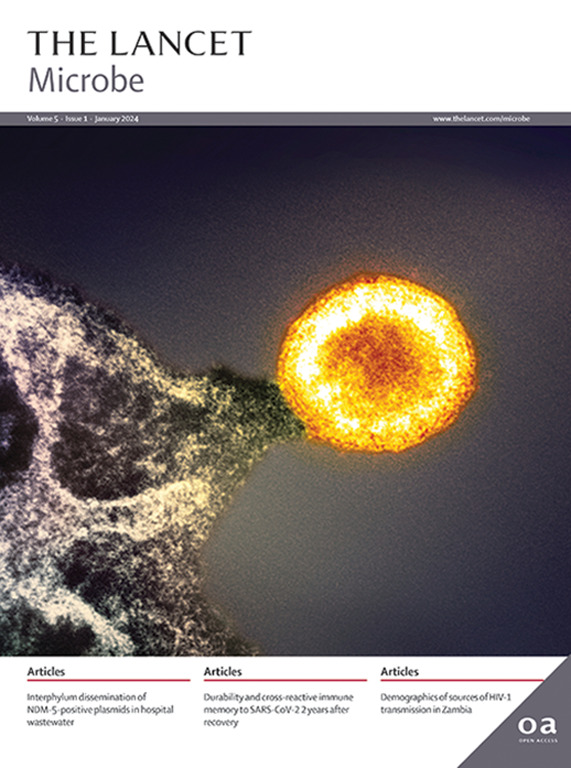贝塔变体 COVID-19 疫苗 AZD2816 和 AZD1222(ChAdOx1 nCoV-19)作为巴西、南非、波兰和英国以前未接种过疫苗的成年人的主要系列疫苗的免疫原性和安全性:一项随机、部分双盲、2/3 期非劣效免疫桥接研究。
摘要
背景:AZD2816是一种变异适应型COVID-19疫苗,它表达全长SARS-CoV-2 beta变异尖峰蛋白,但在其他方面与AZD1222(ChAdOx1 nCoV-19)相似。这项研究旨在评估 AZD1222 或 AZD2816(或两者)初级疫苗接种的安全性和免疫原性:在这项2/3期、随机、多国、主动对照、非劣效、免疫桥接研究中,巴西、南非、波兰和英国的16个研究机构招募了之前未接种过COVID-19疫苗的成年参与者。参与者按年龄、性别和合并症进行分层,以5:5:5:2的比例随机分配接受AZD1222(AZD1222组)、AZD2816(AZD2816[4周]组)或AZD1222-AZD2816(AZD1222-AZD2816组)的主要系列,给药间隔为4周,或AZD2816给药间隔为12周(AZD2816[12周]组),并在第2次给药后180天评估其安全性和免疫原性。主要结果是安全性(每次给药后 7 天内发生的主动不良事件率和 28 天内发生的主动不良事件率)和免疫原性(伪病毒中和抗体几何平均滴度 [GMT] 的非劣效性、在基线血清反应阴性的参与者中,AZD2816 [间隔 4 周] 抗 beta 与 AZD1222 抗 SARS-CoV-2 的免疫原性(假病毒中和抗体几何平均滴度 [GMT]、GMT 比值差值 0-67 和血清反应率、比率差值 -10%,在用药 2 后 28 天记录)。该试验已在 ClinicalTrials.gov 登记,编号为 NCT04973449,并已完成:2021年7月7日至11月12日期间,1449名参与者被分配到AZD1222组(413人)、AZD2816(4周)组(415人)、AZD1222-AZD2816组(412人)和AZD2816(12周)组(209人)。AZD1222组基线血清阴性的378名参与者中有10名(2-6%)、AZD2816(4周)组379名参与者中有9名(2-4%)、AZD1222-AZD2816组380名参与者中有8名(2-1%)、AZD2816(12周)组191名参与者中有11名(5-8%)发生了与疫苗相关的主动不良事件。AZD1222组有1人(0-3%)、AZD2816(4周)组有1人(0-3%)、AZD1222-AZD2816组有2人(0-5%)、AZD2816(12周)组无严重不良事件记录。达到了共同主要免疫原性终点:第2剂后28天,AZD2816(4周)组中和抗体GMT(比值比1-19 [95% CI 1-08-1-32];下限大于0-67)和血清反应率(差异1-7% [-3-1至6-5];下限大于-10%)与AZD1222组中和抗体GMT(比值比1-19 [95% CI 1-08-1-32];下限大于0-67)相比,AZD2816(4周)组中和抗体GMT与AZD1222组中和抗体GMT相比并不劣效。AZD2816对β的血清反应率最高(12周间隔为94-3% [95% CI 89-4-97-3];4周间隔为85-7% [81-5-89-2]),AZD1222对祖先SARS-CoV-2的血清反应率最高(84-6% [80-3-88-2]):AZD1222和AZD2816的初次系列接种耐受性良好,没有突发的安全性问题。这两种疫苗对β型和祖先型SARS-CoV-2都有很强的免疫原性,在对与各自疫苗所针对的SARS-CoV-2株型相匹配的SARS-CoV-2株型进行测试时,反应更强。这些研究结果表明,COVID-19 祖代疫苗在预防严重的 COVID-19 方面仍然具有重要作用,并强调了使用 ChAdOx1 平台开发针对未来 SARS-CoV-2 变种的 COVID-19 疫苗的可行性:资金来源:阿斯利康公司。Background
AZD2816 is a variant-adapted COVID-19 vaccine that expresses the full-length SARS-CoV-2 beta variant spike protein but is otherwise similar to AZD1222 (ChAdOx1 nCoV-19). This study aimed to evaluate the safety and immunogenicity of AZD1222 or AZD2816 (or both) primary-series vaccination in a cohort of adult participants who were previously unvaccinated.
Methods
In this phase 2/3, randomised, multinational, active-controlled, non-inferiority, immunobridging study, adult participants previously unvaccinated for COVID-19 were enrolled at 16 study sites in Brazil, South Africa, Poland, and the UK. Participants were stratified by age, sex, and comorbidity and randomly assigned 5:5:5:2 to receive a primary series of AZD1222 (AZD1222 group), AZD2816 (AZD2816 [4-week] group), or AZD1222-AZD2816 (AZD1222-AZD2816 group) at 4-week dosing intervals, or AZD2816 at a 12-week interval (AZD2816 [12-week] group) and evaluated for safety and immunogenicity through 180 days after dose 2. Primary outcomes were safety (rates of solicited adverse events occurring during 7 days and unsolicited adverse events occurring during 28 days after each dose) and immunogenicity (non-inferiority of pseudovirus neutralising antibody geometric mean titre [GMT], GMT ratio margin of 0·67, and seroresponse rate, rate difference margin of –10%, recorded 28 days after dose 2 with AZD2816 [4-week interval] against beta vs AZD1222 against ancestral SARS-CoV-2) in participants who were seronegative at baseline. This trial is registered with ClinicalTrials.gov, NCT04973449, and is completed.
Findings
Between July 7 and Nov 12, 2021, 1449 participants were assigned to the AZD1222 group (n=413), the AZD2816 (4-week) group (n=415), the AZD1222-AZD2816 group (n=412), and the AZD2816 (12-week) group (n=209). Ten (2·6%) of 378 participants who were seronegative at baseline in the AZD1222 group, nine (2·4%) of 379 in the AZD2816 (4-week) group, eight (2·1%) of 380 in the AZD1222-AZD2816 group, and 11 (5·8%) of 191 in the AZD2816 (12-week) group had vaccine-related unsolicited adverse events. Serious adverse events were recorded in one (0·3%) participant in the AZD1222 group, one (0·3%) in the AZD2816 (4-week) group, two (0·5%) in the AZD1222-AZD2816 group, and none in the AZD2816 (12-week) group. Co-primary immunogenicity endpoints were met: neutralising antibody GMT (ratio 1·19 [95% CI 1·08–1·32]; lower bound greater than 0·67) and seroresponse rate (difference 1·7% [–3·1 to 6·5]; lower bound greater than –10%) at 28 days after dose 2 were non-inferior in the AZD2816 (4-week) group against beta versus in the AZD1222 group against ancestral SARS-CoV-2. Seroresponse rates were highest with AZD2816 against beta (12-week interval 94·3% [95% CI 89·4–97·3]; 4-week interval 85·7% [81·5–89·2]) and with AZD1222 (84·6% [80·3–88·2]) against ancestral SARS-CoV-2.
Interpretation
Primary series of AZD1222 and AZD2816 were well tolerated, with no emergent safety concerns. Both vaccines elicited robust immunogenicity against beta and ancestral SARS-CoV-2 with greater responses demonstrated when testing against SARS-CoV-2 strains that matched those targeted by the respective vaccine. These findings demonstrate the continued importance of ancestral COVID-19 vaccines in protecting against severe COVID-19 and highlight the feasibility of using the ChAdOx1 platform to develop COVID-19 vaccines against future SARS-CoV-2 variants.
Funding
AstraZeneca.

 求助内容:
求助内容: 应助结果提醒方式:
应助结果提醒方式:


